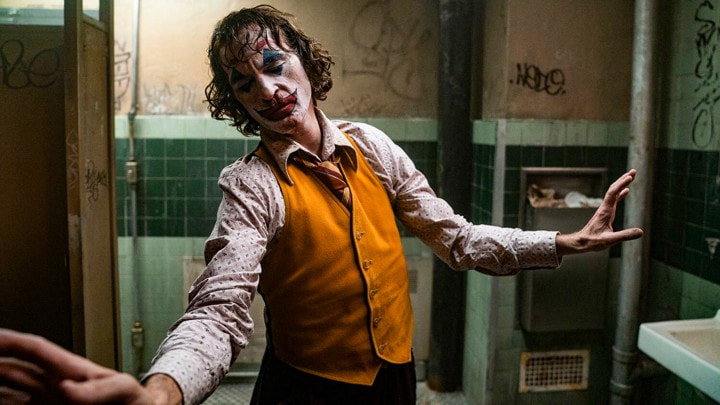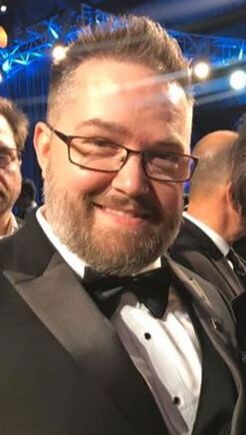|
It's amazing to me that the new film "Joker" has already stoked such a visceral reaction among fans and critics alike. It will be hated, it will be loved, and there's validity to both sides of the debate. But for a film to incite such strong emotions - good or bad - it must be effectively operating on some level, and for me, it's as unforgettable a film as you'll see all year. Grade: A-It's impossible to feel indifferent about "Joker," the new into-the-mind-of-madness character study from director Todd Phillips, a guy who to this point has been known for hit comedies like "Old School" and "The Hangover" trilogy. But this film is no joke. It's a movie that already has created more than its fair share of controversy for not only its depiction of violence and mental illness, but for its alleged sympathy in which it shows towards its characters and these hotly-debated subjects. Is "Joker" promoting the very sort of evil it's depicting? Does "Joker" champion the societal outcast and justify this sort of violent, deviant behavior? Will "Joker" become a rallying cry for "incels" in the real world and give those on the fringe more reason to act out? The answers to these questions are complex, but they're not "no." They're also not "yes." I would argue that it isn't the filmmakers responsibility to answer ANY of the questions facing our society, but that the best, most powerful films tend to offer us some meaningful reflections...holding a mirror up to systemic problems and not a microphone. And filmmakers sure as hell should not be intimidated by outside pressure when simply raising tough issues...I find the conversation being had around the "Joker" helpful, not harmful, to the bigger picture. Pretty deep for a so-called "comic book movie," huh? One thing that critics on both sides have agreed on so far is that Joaquin Phoenix's portrayal of Arthur Fleck (aka The Joker) is simply phenomenal...it's hard to believe that he would not be a complete shoe-in for Oscar gold. His performance gives nuance and depth to a crazy-person, and one of the most recognizable super-villains in popular culture. If...ok, WHEN he is nominated for an Oscar, it will be the 2nd time that an actor portraying The Joker (following Heath Ledger's iconic turn in "The Dark Knight") will have been nominated. Joker is a role that all actors want to play, because it's a role that has so many layers, and so much history, yet is completely open for interpretation. Speaking of which, this film's plot sort of picks and borrows pieces of known Joker lore from the comic book, TV series and prior movies as source material. As The Joker once famously stated on the page, he likes to think of his past as being "multiple choice," and he's also not a very reliable narrator. Phillips decides to tell this Joker story set in an early-1980s Gotham City, a city that is depicted in dull browns and grays that perfectly juxtaposes the bright splashes of color that the Joker will eventually bring to the city (and prior to the dark blacks and blues that Batman will eventually bring). Arthur Fleck is an oddball even among oddballs, who dresses up as a clown and holds signs in front of local businesses to earn a buck. He's an aspiring stand-up comic, and he lives with his delusional mother (the wonderful Frances Conroy), who may or may not have had a past with the billionaire businessman Thomas Wayne (Brett Cullen). The timing is right for the emergence of a deranged criminal in this town. Gotham City is overrun with rats and an excess trash and poverty problem, while politicians and business-types seem to exist in an isolated bubble, travelling downtown to the "nice" part of town to catch a theatrical showing of Charlie Chaplin's "Modern Times" while the rest of the city suffers. The friction between the classes is palpable and nearing a tipping point, and The Joker - well, Arthur Fleck - ends up being the straw that breaks the camel's back. When we meet him, he's down-and-out, but clearly there's something else very, very wrong with his psyche. But he's also portrayed as a product of a broken system. He has a terrible past stemming from a broken family, and no real support in his life. Worse, he has no real barometer for what is real and what isn't. He's suicidal, but mom always told him to put on a happy face. He's on several medications and talks with a government-supplied social worker that keeps him hanging on by a thread, but government cutbacks throw Fleck out into the cold to fend for himself. A co-worker gets him a gun for self-defense, and Fleck ends up using it to kill a few entitled Wayne Enterprise businessmen on a Gotham City subway. The killings make him feel alive and real, for the first time. When Thomas Wayne calls the killer-at-large a "clown" on television, the people of Gotham begin an uprising. They don clown masks and take to the streets, first in peaceful protest, and later, much, much worse. They're mad as hell, and they're not going to take in anymore. Fleck - The Joker - becomes a symbol of revolt, a psycopathic Robin Hood who kills the rich to feed the poor souls of Gotham. Watching Phoenix evolve from socially-awkward, mentally-ill weirdo into a fully-embraced anarchist is a mind-blowing sight to behold. Beyond the politics, the violence, and whether the film is sympathizing with this murderer, the film also makes some subtle inferences to a culture obsessed with television and popular culture. Fleck, for instance, imagines himself a successful, well-liked comedian on a local late-night show, with host Murray Franklin (Robert De Niro) giving his blessing to him, like Johnny Carson might to an otherwise unknown up-and-coming comic. The movie eludes to the fact that The Joker might not have ever become the Joker, if not just for the systemic societal problems that affected his life, but if any of these positive fantasies could have ever materialized for Arthur Fleck. But the TV plays a big role in this film. It informs the community and ultimately leads to the rioting, and it also acts as the only real connection a guy like Arthur Fleck has ever been able to make. And what he sees over these airwaves is all-powerful, and in fact, leads him directly into his eventual persona. He also fantasizes about a neighbor in his apartment building (Zazie Beetz), and it's all very revealing...Fleck doesn't WANT to become The Joker, the movie suggests that he has no other choice. A kid who was abandoned and abused turns into a man without any of the necessary social skills needed to succeed in a tough, cold world. He is spit up and chewed out, bullied and beaten, and tossed aside. The world doesn't care about Arthur Fleck, or those like Arthur Fleck, so why should he care about the world? His terrible existence is even built on a foundation of lies, and if you're Arthur Fleck, it's not hard to imagine him not knowing which way is up, or what's real and what isn't, once the rug is pulled from underneath him. So the question becomes, should we then sympathize with a person who is driven to madness? Is Todd Phillips, with his "Joker" movie, exploiting people like Arthur Fleck or is he simply holding up a mirror to real-world issues that face many Americans? Personally, I think there is intellectual evidence in this film that builds a case for the latter, despite knowing that masses upon masses of people might lean towards the former. Not helping things, those that The Joker kills in the movie - with the exception of one person near the end - sort of had it coming. I wish that the filmmakers would have been even more bold: If this guy is truly a bad guy, then have him do clear-cut bad things...trying to justify some of these killings on-screen (who cares about Wall-Street-types? Who cares about low-life street thugs?) sort of does open the film up for scrutiny. Worst of all, the film gets super-preachy and soap-boxy towards the end when Fleck is finally invited on the Murray Franklin show...and without giving anything away, let's just say that nothing that came previously in this film would have led us to believe that Fleck would have been able to talk or act in the way that he effortlessly does. It comes across as contrived and convenient, when the rest of the movie felt so...grounded. If you're able to separate all of the heavier stuff, comic book fans will also appreciate how this movie anchors Fleck's journey to key events in the Batman canon. These elements are done cleverly, and they continuously pull us back onto the comic book pages, just as we begin to see this character existing in the "real world." It dulls the edges just enough, but - judging on people's responses to the film - not nearly enough. Beyond Todd Phillips and Phoenix not quite being able to stick The Joker's landing, this film doesn't contain one frame that doesn't engage your senses. And while I can see and respect the problems that others have raised with the film, "Joker" did not create any of these issues. We've been cheering for bad guys for a long time now (Tony Soprano or Walter White, anyone?) and just because a film or a filmmaker decides to explore what makes men like this tick, doesn't necessarily mean it's agreeing with the depicted behavior. I also reject the negative reviews I've heard regarding the aesthetic of "Joker," in that it's ripping off movies like "Taxi Driver" and "The King of Comedy," both of which starred Robert De Niro and were directed by Martin Scorsese. If you find yourself up-in-arms because a movie is borrowing, echoing, or otherwise emulating other movies from the past, well I have bad news for you about all movies. I feel criticisms like this stem from an initial dislike of other elements included in the film (like the themes we're discussing here), and once you decide you don't like something, it's easy to pick apart the movie in other ways. I get it, we all do the same thing. But any movie about a psychopathic loner shouldn't now be off-limits simply because Scorsese already covered that ground, and perhaps did a better job. Cinema is a vast landscape with room for many interpretations, and imitation is the sincerest form of flattery. Now as for the meta-connections to De Niro in "The King of Comedy"? That's a better argument, and it makes you wonder whether or not his casting had some deeper meaning or purpose. But I digress. There's a hunger and an obsession for characters like The Joker, and this character in particular has become massively popular not in spite of his anarchist views on life, but because of them. He kills weekly on the pages of DC comics and has for over 50 years, yet it's only now that movie-goers and critics are taking issue. If "Joker" appalls you to your very core, the issues you have aren't with The Joker, it might be because you are looking for movies like "Joker" to provide answers to tough questions...questions that are not the responsibility of Hollywood to answer. I get the frustration and the animosity, but all of these problems existed well-before "Joker" and will unfortunately exist for well-after. Instead of focusing our anger and frustration on the messenger, perhaps our energies are better spent focusing on the message. For me, "Joker" doesn't sympathize or let Fleck off the hook, but it's more of a cautionary tale and a brutally honest exploration of a broken-down mind...containing one of the deepest and most-invested performances I've seen on screen since, well, Heath Ledger. In preparation for this film, I had interviewed a Criminologist from the University of Michigan - Dearborn, Dr. Kevin Early (the full interview of which can be seen below), who said something very interesting (and I paraphrase): We all have a good dog and a bad dog within us, and although we would all like to think of our "good dog" as winning out most of the time, the real answer is that the one that wins out is the one that you feed the most. "Joker" is striking a nerve not because of how implausible it is, but because of how close to home it hits. There is an Arthur Fleck in all of us. And that thought may just be subconsciously more than many movie-goers can bear. Grade: A- Genre: Crime, Drama, Thriller. Run Time: 2 hours 1 minute. Rated R. Starring: Joaquin Phoenix, Robert De Niro, Zazie Beetz, Frances Conroy, Bill Camp, Shea Whigham, Brett Cullen, Douglas Hodge. Co-Written and Directed by Todd Phillips ("Road Trip," "Old School," "The Hangover," "The Hangover Part II," "The Hangover Part III," "War Dogs"). "Joker" is in theaters everywhere on Friday, October 4th, 2019. Watch our FULL INTERVIEW with a Criminologist from the U. of Mich. - Dearborn discussing the societal impact and cultural significance of the film, "Joker," below.
0 Comments
Leave a Reply. |
Looking for a specific movie or review?
Search Below: Categories
All
Archives
May 2024
|
tom santilli movie reviews
Tom Santilli is a professional film critic, TV personality, host and
the Executive Producer of Movie Show Plus.
He also is the featured film critic appearing on WXYZ Channel 7 Action News in Detroit,
and appeared weekly on FOX-2 in Detroit from 2016-2020.
Feel free to use the "search" below to find your favorite titles.
TOM'S GRADING SCALE:
B- and above: Thumbs Up
C+ or below: Thumbs Down
Currently Airing:Check Local Listings
|
For more information on Movie Show Plus, Email: |


 RSS Feed
RSS Feed
